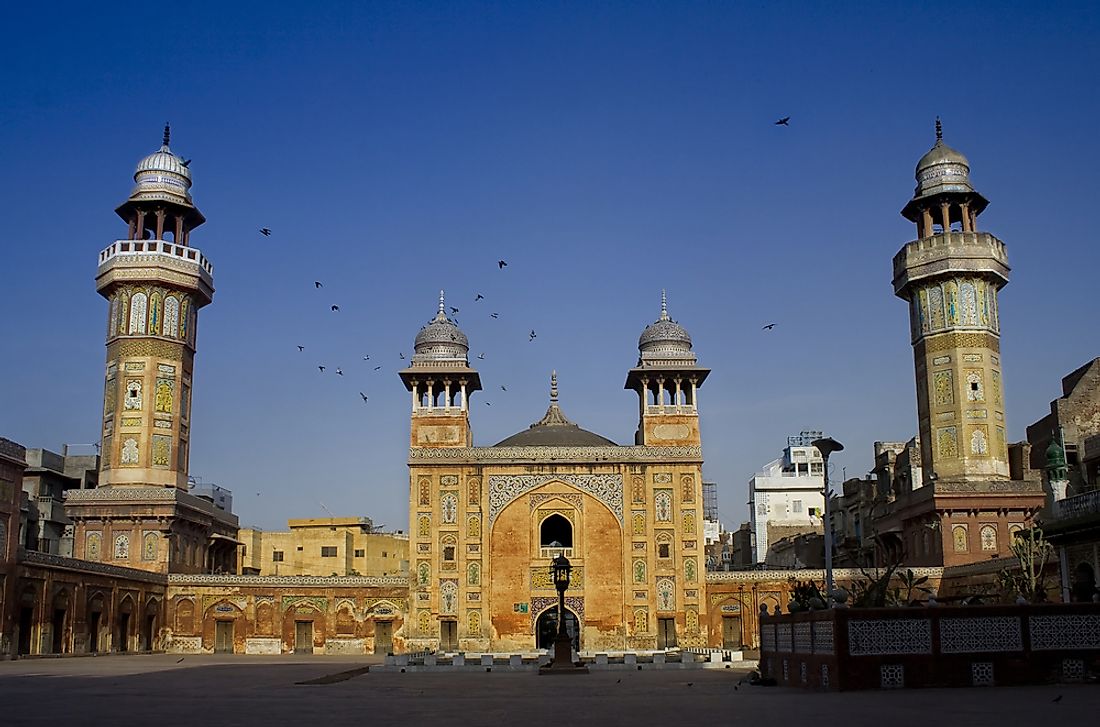Religion in Pakistan

Pakistan, the 36th largest country in the world spans a land area of 881,913 km2 and has a coastline measuring 1,046 km along the Arabian Sea and the Gulf of Oman. Islam is the state religion and main religion of Pakistan, observed by 96.03% of the population. In fact, Pakistan is the only country to been created in the name of Islam. It was established in 1947 exclusively for Muslims of the Indian sub-continent, immediately after the British left India.
The partition of the British Raj into the independent countries of India and Pakistan witnessed great migrations of Hindus and Muslims across the newly created borders. This period was a tragic time for the people of the region who had earlier fought against the British colonists in a united manner. The new Constitution adopted by Pakistan in 1956 officially declared it as an Islamic country. The country is the world’s second most populous Muslim-Majority after Iran with 97% of the population being Muslims. Pakistan's religious beliefs and systems include;
Islam - 96.03%
Sunni Islam
Sunni Islam holds the belief that Abu Bakr, who was Prophet Muhammad's father-in-law, was the first Caliph contrary to Shias who believed that the first Caliph was Ali ibn Abi Talib who was Prophet Muhammad’s son-in-law and cousin. The word Sunni is an Arabic word, Sunnah, which are used to refer to Prophet Muhammad’s teachings and saying as recorded in hadith. Sunni Islam is the largest denomination of Islam in both the world and the largest religion in Pakistan constituting 82.8% of the population. Sunni has six pillars of iman and 105 key points of the creed which unites them. The theological study and doctrine of the Sunni Muslim are called the Sunnism.
Shia Islam
The Shia population in Pakistan is estimated as being 11.8% of the country’s population. Pakistan has the third largest Shia population after India and Iran. The constant tension between Shia and Sunni has led to the creation of Shia-Specific organizations. Members of this religious group have suffered persecution specifically from Mughal Emperors. Shias have played an important role in Pakistan’s independence and national building. Shias have also been elected into top offices in the country. The Shia community is spread across the country with distinct communities including Bangash, Qizilbash, Hazaras, Baltis, and Bohris. There are minor divisions within the Shia community with the majority belonging to Ithna ‘ashariyan, Nizari Ismailis, Mustaali, and Sulaimani Bohra.
Hinduism - 1.85%
Hinduism in Pakistan is practiced by the Hindus of Pakistani descent. Pakistani Hindus constitute 1.85% of Pakistan’s total population. The majority of the Hindus in Pakistan live in the Sindh Province. Over 9 million Hindus migrated to India after Pakistan’s independence in 1947 while over one million lost their lives in the process. Hindus consider Indus River as very holy and a place of pilgrimage. They are also allotted separate seats in the provisional, national, and Senate assemblies.
Christianity - 1.59%
Christianity is one of the largest non-Muslim religions in Pakistan. 1.59% of the Pakistani population practice Christianity of which Roman Catholics and Protestants make the majority. Christianity came to Pakistan in 1877 through Rev Thomas Valpy French of the Anglican Church. Later, when Europeans settled in Pakistan, more Muslims were converted to Christianity. Christians established churches, colleges, schools, and hospitals. However, when Pakistan became an Islamic Republic in 1956, the activities of Christians were significantly reduced.
Ahmadi - 0.22%
It is difficult to get an exact measure of the Ahmadi population in Pakistan. The estimate of 0.22% is estimated to be on the low end. A parliamentary tribunal in Pakistan does not consider the Ahmadi population to be Muslim, a controversial ruling.
Other - 0.07%
Some of the other minority religions in Pakistan include Bahá'í, Sikhism, Zoroastrianism, Kalash, and Jainism.
Religious Beliefs And Freedoms In Pakistan
| Rank | Belief System | Share of Pakistani Population |
|---|---|---|
| 1 | Sunni Islam | 82.8% |
| 2 | Shia Islam | 11.8% |
| 3 | Hinduism | 1.8% |
| 4 | Ahmadi Islam | 1.8% |
| 5 | Christianity | 1.4% |
| 6 | Baha'i Faith | <0.1% |
| 7 | Sikhism | <0.1% |
| 8 | Zoroastrianism | <0.1% |
| 9 | Kalash | <0.1% |







